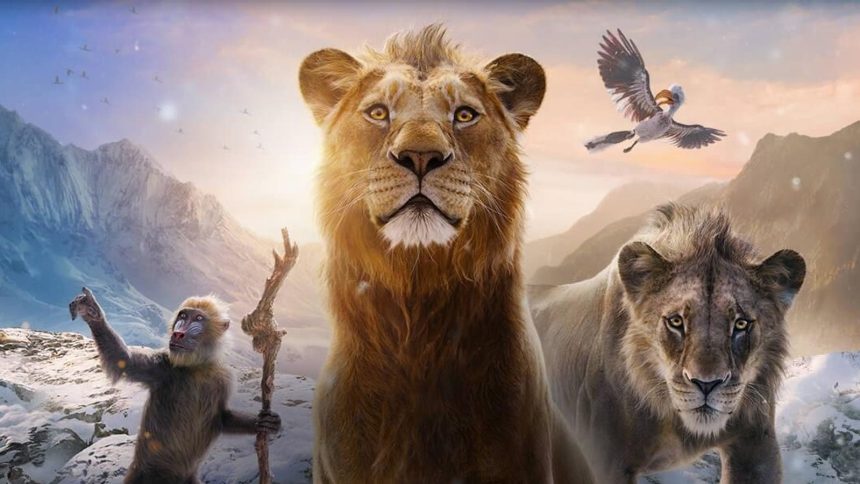Mufasa: The Lion King, a computer-animated prequel to the 2019 photorealistic remake of the Disney classic, journeys back to the Pride Lands to explore the untold story of how Mufasa rose to become the beloved king. Directed by Academy Award-winner Barry Jenkins, the film employs a narrative framework where Rafiki, the wise mandrill, recounts Mufasa’s life story to Simba and Nala’s daughter, Kiara, with Timon and Pumbaa interjecting their characteristic comedic commentary. The narrative unfolds primarily through flashbacks, offering a poignant glimpse into Mufasa’s challenging upbringing and the forging of crucial relationships that shaped his destiny.
The film delves into Mufasa’s origins as a solitary orphaned cub, adrift and vulnerable in the vast savanna. A chance encounter with another young lion named Taka, who later becomes the infamous Scar, alters the course of both their lives. This meeting forms the foundation of an unlikely alliance, bringing together a diverse group of misfits striving to find their place in the world. Their shared journey is fraught with peril, as they must navigate a treacherous landscape and confront a formidable, deadly adversary. This shared adversity tests the strength of their bonds and reveals the true character of the future king.
The voice cast of Mufasa: The Lion King boasts a blend of returning talent and fresh additions, contributing to the emotional depth and narrative richness of the film. Aaron Pierre lends his voice to the adult Mufasa, embodying the regal and compassionate nature of the iconic lion king. Kelvin Harrison Jr. voices Taka, providing a nuanced portrayal of the complex character who eventually transforms into the embittered Scar. The film promises to explore the origins of the brothers’ complicated relationship and the events that led to their tragic conflict.
Tiffany Boone voices Sarabi, Mufasa’s queen and Simba’s mother, adding another layer of emotional depth to the narrative. Returning from the 2019 remake, the comedic duo of Billy Eichner as Timon and Seth Rogen as Pumbaa provides levity and familiar charm to the story. Their presence, while narratively positioned as retelling the story, serves to connect the prequel to the existing Lion King universe.
Adding continuity to the narrative, John Kani reprises his role as the elderly Rafiki, his wisdom and gentle guidance serving as the narrative thread that connects Mufasa’s past to Kiara’s present. Donald Glover also returns as the adult Simba, now a father reflecting on his own legacy. In a touching casting choice, Blue Ivy Carter, daughter of Beyoncé and Jay-Z, voices young Kiara, adding a youthful perspective to the unfolding tale.
Mads Mikkelsen joins the cast as Kiros, a new character whose role in Mufasa’s journey remains to be fully revealed. Anika Noni Rose lends her voice to Afia, another addition to the Pride Lands’ inhabitants. Braelyn Rankins voices the young Mufasa, capturing the vulnerability and resilience of the cub who would become king. Finally, Keith David brings his gravitas to the role of Masego, adding another dimension to the intricate tapestry of characters within the Pride Lands.
The casting of established and rising stars reflects the film’s ambition to deliver a compelling narrative that resonates with both longtime fans of The Lion King and a new generation of viewers. By exploring Mufasa’s past, the film seeks to deepen our understanding of this beloved character, revealing the experiences that shaped him into the wise and courageous leader audiences have come to admire. The use of flashbacks, interwoven with Rafiki’s storytelling, promises a layered narrative that connects the past and the present, exploring themes of family, destiny, and the cyclical nature of life in the Pride Lands.
The film’s release marks another chapter in the enduring legacy of The Lion King, continuing to captivate audiences with its timeless story of family, courage, and the circle of life. With its all-star voice cast and the creative vision of Barry Jenkins, Mufasa: The Lion King promises to be a visually stunning and emotionally resonant experience, further enriching the vibrant world of the Pride Lands and offering a fresh perspective on one of Disney’s most cherished stories. The film seeks to not just retell a familiar story, but rather expand the existing narrative and provide context for the events that have already captured the hearts of millions around the globe.
The film explores themes of resilience, the importance of community, and the transformative power of adversity. Mufasa’s journey from a lonely cub to a respected king embodies the spirit of overcoming challenges and finding one’s place in the world. The film also highlights the significance of mentorship and the influence of those who guide us along our paths. Through its exploration of Mufasa’s past, the film invites audiences to reflect on the experiences that shape our own identities and the importance of embracing our own unique journeys of self-discovery.
The computer-animated format allows for a visually captivating portrayal of the African savanna, bringing the vibrant landscapes and its diverse inhabitants to life with stunning detail. The film’s score, composed by Hans Zimmer, who also scored the original Lion King and its 2019 remake, further enhances the emotional impact of the narrative, creating a sonic landscape that evokes the majesty and wonder of the Pride Lands. The music serves as a powerful tool for storytelling, heightening the drama and underscoring the emotional nuances of the characters’ journeys.
Mufasa: The Lion King promises to be an engaging and emotionally resonant cinematic experience, deepening the rich mythology of The Lion King universe. By exploring the origins of one of its most iconic characters, the film offers a new perspective on the timeless themes of family, courage, and the circle of life that have made The Lion King a beloved classic for generations. The prequel aims to both entertain and inspire, reminding us of the power of hope, resilience, and the importance of embracing our own unique paths towards fulfilling our destinies. The film’s exploration of Mufasa’s past serves as a powerful reminder that even the greatest leaders begin their journeys with humble beginnings.



